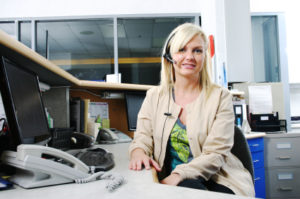Why Your Receptionist Needs Media Training
A few months ago, I wrote an article that listed seven times you should turn down a media interview. That article became the subject of an on-line chat recently, and one of the participants – a journalist – took me to task.
Her point was this: Who cares if executives turn down an interview? She regularly circumvents executives at the beginning of a crisis, and prefers to start by talking to the receptionist.
“She always knows more anyway,” said the reporter.
She raises a good point. Reporters occasionally avoid “official” channels to get more candid and unscripted responses from staffers lower down on the hierarchy chart. And too often, receptionists – notoriously more plugged in to the gossip than most – inadvertently say something to reporters that they shouldn’t.
It’s always a good idea to train your receptionists how to handle media calls, but it’s even more critical to prepare them for an unexpected crisis. Receptionists are often the first people to learn of a crisis, tipped off by a phone call from a reporter, a colleague, or a stranger. There’s little point in investing thousands of dollars to train your executives to manage a crisis if your receptionist says something he or she shouldn’t.
And it’s not just receptionists. You should also prepare security guards who first greet unscheduled camera crews. And spouses of your executives, who may answer their home phone during a burgeoning crisis and say something like, “Yeah, I think there was an explosion or something at the plant. But you just missed Dawn – she already headed down there.”
Oops. Dawn’s husband just became the reporter’s primary source.
You don’t have to enroll your receptionists, security guards, and other support personnel in a formal media training class. Instead, create a policy that articulates the protocol for unexpected contacts with the media and share them with your entire staff. Don’t do it once – they’ll need regular reminders.
And remember: When you have temps staffing your phones along the way, fill them in on your media procedures. Those “temps” have your company’s reputation in their hands.
Wait! Don’t go! Have you followed us on Twitter yet? Please click the Twitter logo (on the upper right of the blog) or follow us at @MrMediaTraining.
Related: How To Select a Media Trainer
Related: The 21 Most Essential Media Training Links




Brad, thanks for making this important point. Several times we’ve trained staff, other than spokespeople, on handling media or other likely situations such as protestors, irate customers or just dangerous walk-ins off the street.
They can make or break some situations. The other key is that they are trained to NOT make comments to media and understand clearly why it is so important. It’s different but no less important than spokesperson training. I hope business leaders are listening.
Thanks for this interesting post. I wish you could see the international organization where I used to work at for a year, that didnot even allow for the trained people in the capacity of the spokes-persons to comment, did turn down interviews and yet expected to its brand to have been promoted in the media and all! And then, in my capacity of the Communicatio Analyst I was scrutinized for the organization not being in the news enough! Huh!
The world is filled with little dictators!
Administrative Assistants should be added to the trained list. Media and competitors like to buddy up to the administrative assistants to gain confidential information. Former executives who go to work for competitive firms are notorious for calling just to chat. Information can be shared innocently that they otherwise might not share. An assistant must be continually on his or her toes. I know, I used to be an executive administrative assistant.
The front desk where I work (in a public safety agency) is staffed on a rotating basis by a variety of personnel within our division, who are all more than receptionists. They also handle incoming non-emergency phone calls. Each of these two areas of responsibility can include visits or calls by media, often reference breaking stories or cases. This post is an important reminder of how the press will often try to garner inside details or info from any number of sources.